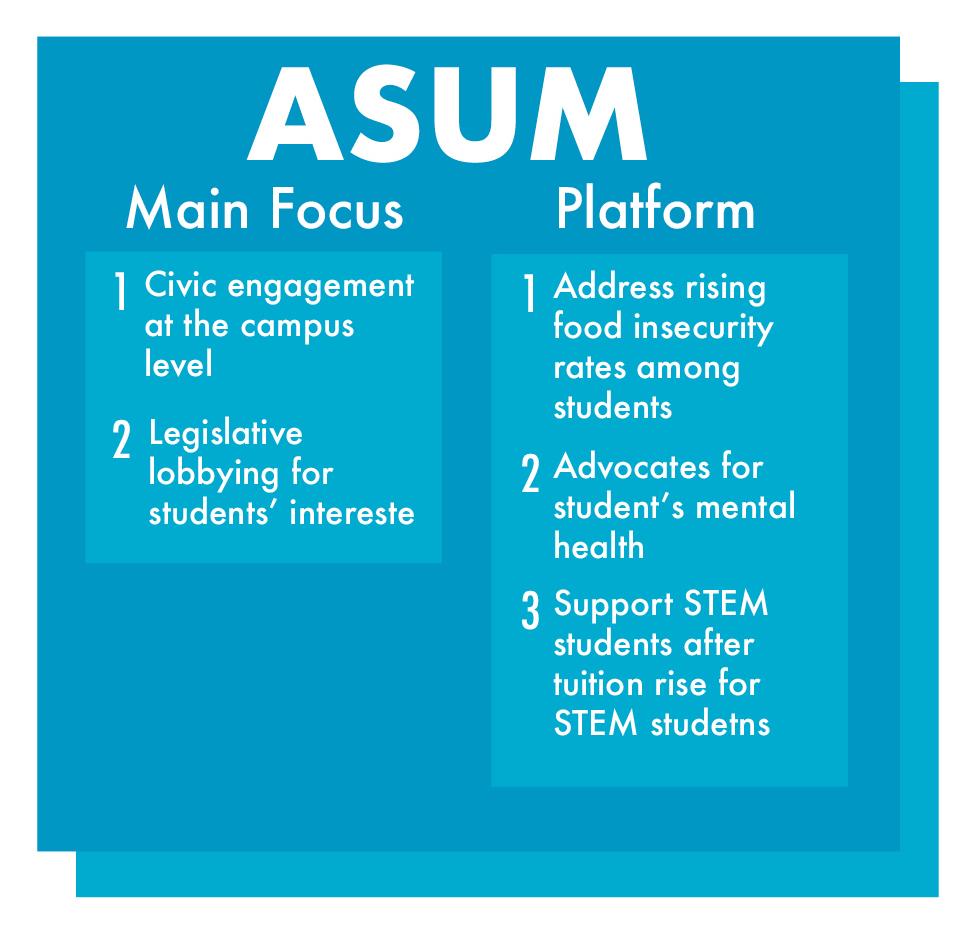The Associated Students of the University of Missouri is the student-run lobbying group for the UM System. Claire Shipp, ASUM’s executive director, said ASUM has two main focuses: civic engagement at the campus level and legislative lobbying for students’ interests.
Shipp said their proposed legislative platform this year is three-pronged: address rising food insecurity rates among students, advocate for students’ mental health and support STEM students after the tuition policy change to differential tuition, a model the makes courses harder to produce more expensive.
At the campus level, ASUM has a policy focused on planning events to encourage civic engagement and working with campus leadership through closed meetings.
Matthew Bozeman, the ASUM MU chapter president, said ASUM’s campus-level team chooses a different topic to focus on every year. This year, they are working on communicating to MU students that political engagement is for more than just a big election year. ASUM hosted events such as Puppies and Politics on Sept. 28, 2021, where students could play with dogs and register to vote, with the goal of making civic engagement fun.
Shipp said on a legislative level, ASUM compiles a list of issues every year and ways they intend on solving them to form a platform. The issues they choose to pursue have a common theme of advocating for what they view is in the best interest of students in the UM System. Shipp said there are common themes from year to year in their platform; some needs never change.
On the legislative level, ASUM focuses on student legislation by lobbying in Jefferson City. Brandon Fenton, ASUM co-legislative director, said ASUM is beholden to a board of directors who approve all policy decisions, so all discussions of platforms are proposals at the moment.
A survey conducted by UMKC found that in 2019, 25.8% of its students reported they had been in a state of food insecurity within the past month. The Missouri Hunger Atlas shows that in 2019, 14.2% of all Missouri residents were as well. Shipp said ASUM sees this as a problem they intend to solve.
Shipp cited an Oregon bill as the guide for how ASUM plans to lobby for this issue. House Bill 2835 is a $4.9 million policy that requires Oregon community colleges and public universities to hire a “benefits navigator” whose full-time job is to assist students in getting the aid they need from all levels of government.
Shipp said ASUM hopes to pilot a program similar to Oregon’s for the UM System. This would entail ASUM writing or supporting legislation that installs the policy while also having a built-in measuring tool to monitor its success.
ASUM also plans on highlighting the importance of mental health in its legislation.
Data from the Center for Disease Control and Prevention shows that in 2018, about 14.3% of Columbia residents aged 18 and older reported that their mental health had been “not good” over the past two weeks.
ASUM has one main plan to expand the mental health resources available to students. Fenton said ASUM is currently looking into clearing logistical hurdles therapists and counselors face when they move between states.
Currently, if a mental health professional wants to move across state lines to Missouri, they would have to be recertified or go through the process of transferring their old credentials. Fenton said removing that requirement would make it easier to get an influx of those professionals to provide additional support to the counseling system.
A Missouri state law amended on Aug. 28, 2021, lifted the tuition cap on public universities. ASUM plans to target the effects of this bill by including it in its top three priorities for this year.
A news release published on the UM System website on May 19, 2021, states that the UM System was reviewing a proposed change to a differential tuition model. The UM Board of Curators will choose whether or not to accept the proposal by spring 2022 at the latest. This means that students will pay more money for majors that cost more for the schools to fund, such as engineering.
At the moment, Fenton said ASUM still sees it as a part of their platform. ASUM will focus on contributing financial help toward those students to offset the increase in tuition.
Besides these three points, Shipp said ASUM’s platform is constantly changing and has room for more issues to arise throughout the year. Shipp said ASUM does this so that they can adapt to the needs of students in the UM System.
To better understand current student needs, ASUM put out its annual student survey on Sept. 3, 2021, which remained open until Sept. 23, 2021. ASUM is currently examining the student responses.
“We’re here to represent you and listen to you and advocate for you,” Bozeman said.
Edited by Emmet Jamieson | [email protected]








